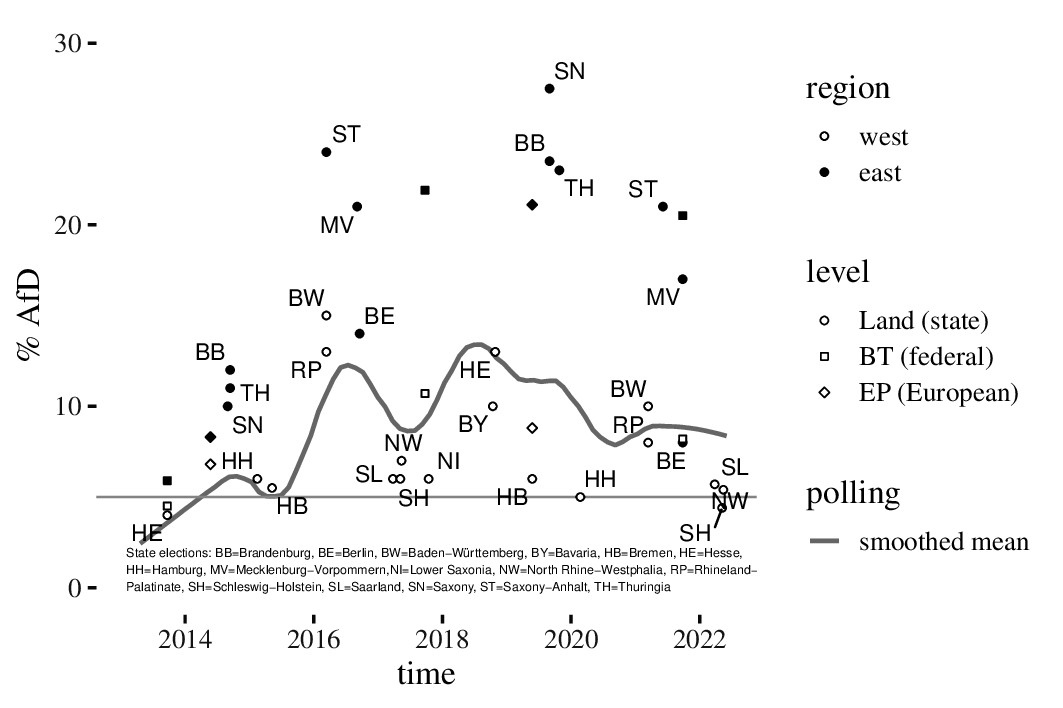What just happened
Yesterday, it was leaked that Germany’s Federal Office for the Protection of the Constitution (the domestic intelligence agency) “suspects” the AfD might be a right-wing extremist organisation that aims to undermine democracy in Germany . Forming this suspicion is an internal process (the agency is under a gagging order and has not commented on the reports) has technical-legally consequences: the office may now infiltrate the AfD, or tap their computers and telephones.
So, a German government agency may be infiltrating a largish opposition party. You may have questions that would warrant a lengthy blog post. But there are many other things to do. The easy way out is to copy and paste some of the questions I was asked yesterday by journalists along with the answers I gave them.
Almost an interview
How do you describe the Alternative for Germany party? How many factions exist inside the party?
Two main camps exist within the party: one group is very much akin to other European radical right-win populist parties. They are staunchly anti-immigrant and have a narrow, illiberal concept of democracy. The other, even more radical camp maintains ties to extremist (i.e. openly anti-democractic) actors and organisations and used to operate under the name of the “wing”. There used to be a third group that was economically liberal and softly eurosceptic, but most of them have left the party over the last years.
Why did the security services decide to put the entire AfD under surveillance at this moment and not before? There has been a radicalisation in AfD in the last months?
There was a de facto split of the party back in 2015, when about ten per cent of the more moderate members left the AfD. Subsequently, the party became more and more radical. The security services began to investigate sub-organisations (its youth organisation and the “wing”) in 2019. They made it clear that they might eventually put the whole party under surveillance as a result of their findings.
This is a year of federal and state elections. Can the decision be seen as politically motivated?
The services are in an unenviable position. On the one hand, the closer we get to the election in September, the greater the danger that this move is seen as political interference. On the other hand, they have to make absolutely sure that they have enough preliminary evidence to put the AfD under surveillance, because the party will fight this decision in the courts.
How do you assess this decision?Placing the entire party under surveillance is a sensitive decision. Do you think it is justified and what effect it might have on politics in Germany?
The decision is momentous: the Office can now (but are not required to) employ a whole range of clandestine measures to collect further information on right-wing extremists within the AfD. In my view, this is, however, justified. Journalists and scientists have uncovered a whole host of links between the AfD and openly extremist actors. The authorities would be derelict in their duties if they did not take a closer look. Moreover, this enhanced surveillance is subject to judicial review, and the AfD has already announced that they would go to court. It is also important to note that treating the party as “suspicious” is an important but intermediate step: the Office will review the information that it garners and may or may not officially classify the party as extremist in their annual reports.
What political consequences can surveillance have for the party?
Putting the AfD under surveillance may induce some members (especially those employed in the public sector, i.e. teachers and members of the police) to leave the party.
Issues of privacy and political freedom aside, knowing that the party as a whole is of interest to the secret service will further stigmatise the AfD in the eyes of large segments of the public. Whether this has political consequences is a matter of debate, because a vast majority (about 80 per cent, according to a Politbarometer poll from November 2019) is already convinced that the AfD is an extremist party that they would never vote for. It is important to note that the AfD has lost some electoral support since 2016 (see the graph below). This is partly as a consequence of increasing awareness of their radicalisation.

Source: official results; Politbarometer & Deutschlandtrend polls. This graph is taken from a working paper on the electoral breakthrough of the AfD and the east-west cleavage in German politics
This decision could lead to a legal disbanding of the party?
Even if the party would be classified as extremist eventually, this would not necessarily lead to a ban. German parties enjoy a very high degree of legal protection and can only be banned by a super majority in the supreme court. Even the NPD, a much clearer case of a right-wing extremist party, survived two attempts to ban them.
Discover more from kai arzheimer
Subscribe to get the latest posts sent to your email.


Likes
Reposts